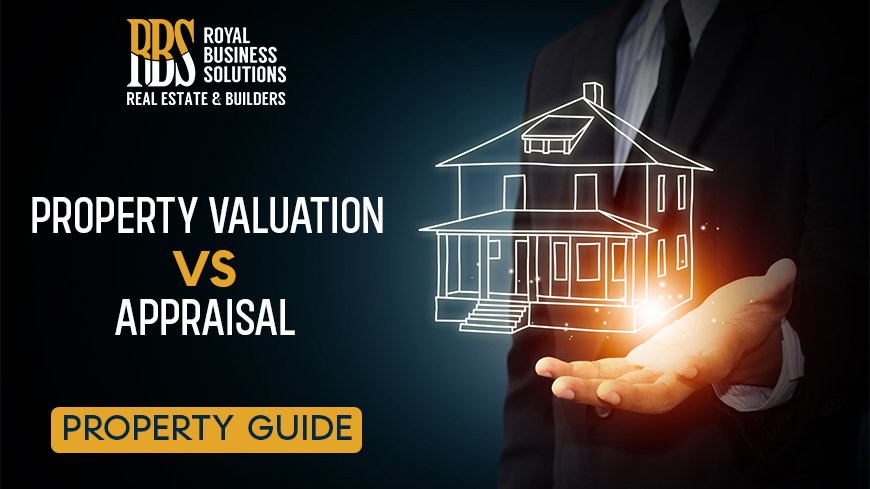- October 31, 2023
- Posted by: Muhammad Shehzad
- Category: Blogs

Introduction
When it comes to buying or selling real estate, two terms that often come up are “Property valuation” and “Appraisal.” Despite their apparent similarities, they have different functions in the real estate sector. It is significant that buyers and sellers both grasp the differences between these two procedures. In this blog post, we’ll discuss the key differences between property valuation and appraisal.
We get asked often about the difference between a property valuation and an appraisal of the same property. Yes, they are both equally significant to a homeowner and serve different purposes.
This is a look at how they differ from one another and when you should buy one.
Key Differences Between Property Valuation and Appraisal
Objective
The primary objective of property valuation is to give an overall evaluation of a property’s value based on current market conditions and other variables. The appraisal, on the other hand, tries to establish a specific valuation of the property, usually for the purpose of mortgage lending.
Scope
Property appraisal involves a wider range of tasks and can carried out by homeowners, online tools, or real estate agencies. Contrarily, appraisals call for a qualified appraiser to visit the property and produce a thorough report.
Timing
Property evaluations normally carried out as a specific necessity in a real estate transaction, such as when qualifying for a mortgage, whereas property valuations can performed whenever you choose.
Price
Property valuations can simply obtained online or from a real estate agent and often are free or inexpensive. Appraisals are more expensive due to the detailed process and professional knowledge required.
Accuracy
Appraisals are generally considered more accurate, as they involve a thorough inspection and analysis by a licensed professional as compared to property valuation.
Property valuation and appraisal are complementary procedures. They cooperate in many real estate transactions to offer a thorough assessment of a property’s value.
Read: How The Property Market Ended 2023, And What’s On The Cards For 2024
Effects of Implementing Combo of Property Valuation and Appraisal
Here’s how they can complement each other:
Establishing the Asking Price
When a seller wants to know how much to seek for their home, they sometimes start with a property valuation. It offers a general assessment of the property’s value in the open market. The property will, however, go through an appraisal when a buyer is applying for a mortgage to ensure that the agreed-upon price is confirmed by the property’s actual value.
Negotiation
The property appraisal may serve as a point of reference in discussions between buyers and sellers. The price may need to changed if the appraisal comes in below the agreed amount.
Refinancing
The lender may demand an appraisal when homeowners decide to refinance their mortgage to make sure that the property’s worth hasn’t fallen noticeably. To obtain a rough estimate of the value of their property, homeowners may find it helpful to have a property appraisal.
Estate Planning
In estate planning, appraisals are often utilized to establish a property’s value for inheritance or taxation purposes. Property appraisals can also be important in this situation, assisting successors in making sensible choices regarding the property.
Choosing the Right Option
The choice between property valuation and appraisal depends on your specific needs and circumstances. Let’s explore how to determine the most suitable choice for your needs:
If you’re a buyer or seller:
A property valuation can provide you with a reliable assessment of the property’s value if you’re engaged in a typical residential real estate transaction without applying for a mortgage.
Be ready for a formal assessment if you’re participating in a mortgage deal because lenders often want one.
If you’re an investor:
For preliminary investigation and property screening, property values could be adequate.
When you’re preparing to proceed with a purchase or financing, a thorough appraisal will probably required.
If you’re a homeowner:
To get a broad estimate of your home’s value, you can choose to have it valued.
An appraisal is a useful tool to determine the optimal selling price for your property or it might needed by the lender when you refinance or sell it.
Also Read: What Are The Best Strategies To Reduce Taxes On Real Estate Ever?
Conclusion
In summary, property valuation and appraisal are both essential tools in the real estate industry, but they serve different purposes and have distinct scopes. Property valuation provides a general estimate of a property’s worth, while appraisal offers a precise value, typically for mortgage lending purposes. Both processes play a vital role in property transactions, ensuring that buyers and sellers have a clear understanding of a property’s value and that lenders can make informed decisions.
For further details check out RBS.
